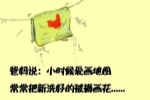
2023年东莞中考英语作文【一】
1。 头绪分明,脉络清楚
写好记叙文,首先要头绪分明,脉络清楚,明确文章要求写什么。要对所写的事件或人物进行分析,弄清事件发生、发展一直到结束的整个过程,然后再收集选取素材。这些素材都应该跟上述五个“ W ”和一个“ H ”有关。尽管不是每篇记叙文里都必须包括这些“ W ”和“ H ”,但动笔之前,围绕五个“ W ”和“ H ”进行构思是必不可少的。
2。 突出中心,详略得当
在文章的框架确定后,对支持故事的素材的选取是很关键的。选材要注意取舍,应该从表现文章主题的需要出发,分清主次,定好详略。要突出重点,详写细述那些能表现文章主题的重要情节,略写粗述那么非关键的次要情节。面面俱到反而使情节罗列化,使人不得要领。这一点是写好记叙文要解决的一个基本问题,也需要一定的技巧。如:
One night a man came to our house and told me, "There is a family with eight children。 They have not eaten for days。" I took some food with me and went。
When I finally came to that family, I saw the faces of those little children disfigured (破坏外貌) by hunger。 There was no sorrow or sadness in their faces, just the deep pain of hunger。
I gave the rice to the mother。 She divided the rice in two, and went out, carrying half the rice。 When she came back, I asked her, "Where did you go?" she gave me this simple answer, "To my neighbors — they are hungry also!"
3。 用活语言,准确生动
记叙文要用具体的事件和生动的语言对人、事、物加以叙述。一篇好的记叙文的语言既要准确、生动,又要表现力强,这样才能把人、事描写得具体生动,其可读性才强。试比较下面一篇例文修改的前后效果。
原文:
One day Xiaoqiang was wandering away。 He was soon lost among people and traffic。 He could not find the way back home and started crying。 Just then, two young students who were passing by found him standing alone in front of a shop and crying。 They went up to Xiaoqiang and asked him what had happened。 Xiaoqiang told them how he got lost and where he lived。 The two students decided to take him home。 Mother was pleased to see Xiaoqiang come back safe and sound。 She invited the two students into the house and gave them some money, but they didn't take it。 She served them with tea but they left。
修改后:
The other day, five-year-old Xiaoqiang left home alone and wandered happily in the street。 After some time, he felt hungry so he wanted to go back home。 But he found he was lost among the crowded people and heavy traffic。 When he could not find the way home, he started and crying。 Just then, two young students who were passing by from school found him sanding crying in front of a shop。 They immediately went up to him。
"Little boy, why are you standing here crying?" they asked。
"I want Mom, I go home。" said the boy, still crying。
"Don't worry, we'll send you home。"
And they spent the next two hours looking for the boy's house。 With the help of a policeman, they finally found it。
When the worried mother saw her son come back safe and sound, she was so thankful and she invited the students into her house。 Gratefully, she offered them some money, saying it was a way to express her thanks, but the young students firmly refused it and left without even a cup of tea。
2023年东莞中考英语作文【二】
导入:
第1段:Some people hold the opinion that A is superior to B in many ways. Others, however, argue that B is much better. Personally, I would prefer A because I think A has more advantages.
正文:
第2段:There are many reasons why I prefer A. The main reason is that ... Another reason is that...(赞同A的原因
第3段: Of course, B also has advantages to some extent... (列出1~2个B的优势
结论:
第4段: But if all these factors are considered, A is much better than B. From what has been discussed above, we may finally draw the conclusion that ...(得出结论 オ
2023年东莞中考英语作文【三】
Last Sunday, Jim went out to fly a kite. The kite flew highly in the sky. Jim ran with it happily.
Suddenly the line was broken and the kite flew away. Soon it disappeared. Where was it?
Jim had no idea. So he had to run here and there to look for the kite. At last he saw it on the top of the tree. He tried to get it down. But he couldn’t. He felt sad.
2023年东莞中考英语作文【四】
导入:
第1段:提出一种现象或某种困难作为议论的话题
正文:
第2段:Many ways can help to solve this serious problem, but the following may be most effective. First of all... Another way to solve the problem is ... Finally...(列出2~3个解决此类问题的办法
结论:
第3段:These are not the best but the only two/ three measures we can take. But it should be noted that we should take action to...(强调解决此类问题的根本方法
2023年东莞中考英语作文【五】
导入:
第1段:Recently we’ve had a discussion about whether we should... (导入话题
Our opinions are divided on this topic.(观点有分歧
正文:
第2段:Most of the students are in favour of it.(正方观点
Here are the reasons. First... Second... Finally...(列出2~3个赞成的理由
第3段:However, the others are strongly against it. (反方观点
Their reasons are as follows. In the first place... What’s more... In addition...(列出2~3个反对的理由
结论:
第4段:Personally speaking, the advantages overweigh the disadvantages, for it will do us more harm than good, so I support it.(个人观点 オ
2023年东莞中考英语作文【六】
导入:
第1段:提出一种现象或某个决定作为议论的话题
As a student, I am strongly in favour of the decision. (亮明自己的观点是赞成还是反对
The reasons for this may be listed as follows. (过渡句,承上启下
正文:
第2段:First of all... Secondly... Besides...(列出2~3个赞成或反对的`理由
结论:
第3段:In conclusion, I believe that... (照应第1段,构成"总—分—总"结构
2023年东莞中考英语作文【七】
将一只只油腻的碗碟,浸没在浮满泡沫的盆里,取一块厚纱布将其仔细地擦抹,待清凉的水流,拂过碗体,原来黏糊糊的手感即刻便被滑爽洁净所替代,挂着透明水珠的青花瓷碗,在旁边米黄的大理石桌面上摞得整齐,仿佛一件件珍贵的艺术品。
寒假里洗碗的活我全包了。
以前,别说洗碗了,吃饭时专门坐在桌子前,不拿筷子不端菜,吃完饭,拿腿就走。对于堆在厨房里的碗碟更是视而不见。一次在舅舅家聚餐,吃饭之后的问题便是谁洗碗。为了给妹妹做个表率,我就以黄继光堵枪眼的架势,把舅妈那还没有说出口的俩字堵了回去。
我洗!
快速的把桌子上的大大小小的餐具挪进了厨房,准备挽起袖子大干一场。可是理想是美好的,现实是残酷的。那被我挪得过高的山堆,轰然便倒,顿时红白相间的瓷片在大理石地砖上跳起了叮叮当当的舞,老妈闻声赶来,右手掐腰,左手扶额,一副“你是猪吗?”的表情。
后来,为了让自己爱劳动的美好情怀发扬光大,每天傍晚,一边洗碗一边与家人聊天,说说笑笑。有时候没有什么话题,家里安安静静的,这时我就手握住刚洗完的筷子,一副陶醉的表情唱:“小酒窝,长睫毛,是你最美的记号……”,一只手还在台面上翻飞着。曲毕,做出恍然醒悟状:“这不是写的我吗?鼓掌!”这时妈妈会送我一个逆天的白眼并两个字:脸呢?家里充满了欢乐。
抬头看看窗外,或许,每盏灯下都有相同的故事。在橙红色的灯光下,每只碗上都流动着橙红色的光晕。心中涌起一丝温馨和满足。望着灶台上的青色瓷碗,成就感油然而生。更重要的是,随着油污的清除,觉得心中也有一股清亮的水流,冲刷尘埃,带走世俗,带来洁净,我的心因此变得美好和清亮。
有人以做家务为苦烦,我却独以之为乐。我乐在亲自动手,打理生活,装扮生活,我何尝又不是在亲自装扮自己呢?
2023年东莞中考英语作文【八】
人们常说,有梦想才能有作为,有行动才能有成功。文学大师林语堂曾经说过:“梦无论怎样模糊,总潜伏在我们的心底,使我们的心境永远得不到宁静,直到这些梦想成为现实。”但想要使“这些梦想变为现实”,行动才是唯一的手段的保证。
我看到过许多名人的故事,他们小时侯都有自己的目标,我也知道,他们把目标分成一小段一小段来实现,最终,达到了梦想的高峰。但是,我始终没有找到梦想,直到今天,我读了《面对自己——有梦想才能有作为》这篇文章中的一个故事后,我才找到了自己的梦想。
一条小毛虫朝着太阳升起的地方,慢慢爬行着。它在路上遇到一只蝗虫,蝗虫问它:“你要到哪里去?”毛毛虫边爬边回答:“我昨天晚上做了一个梦,梦见我在大山顶上看见了整个山谷。我喜欢梦中看到的情景,我要把它变为现实。”蝗虫很惊讶地说:“你烧糊涂了?还是脑子进水了?你怎么可能达到那个地方。你只是一条小毛虫耶!对你来说,一块石头就是高山,一个水坑就是无法逾越的障碍。”但小毛虫已经爬远了,根本没有理会蝗虫的话,继续前进。后来,蜘蛛、鼹鼠、青蛙和花朵都以同样的口吻劝小毛虫放弃这个打算。但小毛虫始终坚持向前爬行……终于,小毛虫精疲力尽,用最后的力气建成一个可以休息的小窝——蛹,就“死”了,动物们都来瞻仰这它,等到它们第二次来的时候,小毛虫贝壳状的蛹开始破裂,一只美丽的'蝴蝶出现了!随着轻风吹拂,美丽的蝴蝶翩翩飞到了大山顶上……
这个美丽的传说,告诉我们一个人生哲理:人活在世界上,不能没有梦想;为了自己的梦想,要付出艰辛和努力。我找到了梦想——成为一名记者。我要努力,争取做最好的自己!

















